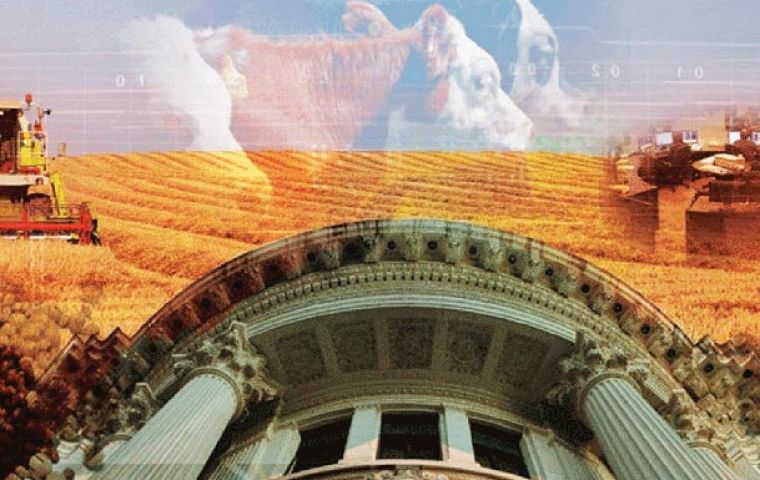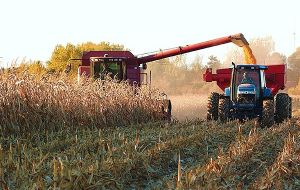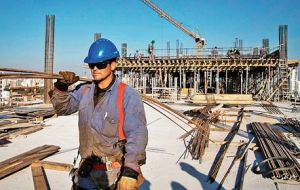MercoPress. South Atlantic News Agency
Argentina's stats office data reveals recession is round the corner
 May's 5.8% monthly decline, sharpest since July 2009, was mostly caused by Argentina's worst drought in decades, which harmed soybean and corn crops
May's 5.8% monthly decline, sharpest since July 2009, was mostly caused by Argentina's worst drought in decades, which harmed soybean and corn crops  Farming activity shrank 35% year-over-year, while industrial output fell 1.4% and transport and communications fell 4.9%.
Farming activity shrank 35% year-over-year, while industrial output fell 1.4% and transport and communications fell 4.9%.  Construction rose 4.4% in May, down substantially from the 10.2% increase in April, while wholesale and retail commerce rose 0.5% compared with 5.5% in May
Construction rose 4.4% in May, down substantially from the 10.2% increase in April, while wholesale and retail commerce rose 0.5% compared with 5.5% in May Argentina's economy shrank 5.8% in May versus the same month last year, government statistics agency Indec said on Tuesday, the second straight month of declines in a sign of looming recession and a possible GDP contraction in 2018.
The sharpest monthly decline since July 2009 was mostly caused by Argentina's worst drought in decades, which harmed soybean and corn crops. Farming activity shrank 35% year-over-year, while industrial output fell 1.4% and transport and communications fell 4.9%.
The drought was one factor behind a run on the peso currency and financial market volatility that prompted Argentina to turn to the International Monetary Fund for an emergency loan. Argentina has also suffered from a broader investor pullback from risky emerging market assets.
While the government began the year with rosy forecasts of growth above 3% this year after a 2.9% expansion in 2017, many analysts began predicting a recession -- two straight quarters of negative growth -- for 2018 after the country announced in May it was turning to the IMF.
The Fund still expects a slight expansion of 0.4% in 2018, and the government says it could be even higher. But May's decline increased the chances that overall growth could be negative despite a strong first quarter.
“We see a very significant risk that the economy will experience a recession in 2018 ... and that real GDP growth in 2018 will dip into negative territory,” Alberto Ramos, head of Latin America economics at Goldman Sachs, wrote in a note.
Tighter fiscal policy as the government cuts public works spending to reach its deficit targets and high interest rates as the central bank seeks to fight incessant inflation mean the economy would “remain soft in coming quarters,” Ramos wrote.
Construction activity rose 4.4% in May, down substantially from the 10.2% increase in April, while wholesale and retail commerce rose 0.5% compared with 5.5% in May. The financial sector grew 10.8% and real estate activity grew 4%. Economic activity declined 1.4% when compared with April, the data showed.
Indec also revised its estimates for April's economic activity to a 0.6% decline year-over-year, compared with 0.9% previously, and a 2.8% decline month-on-month, compared with 2.7% previously.




Top Comments
Disclaimer & comment rules-

Read all commentsSince taking office in December 2015, president Mauricio Macri has been promising a transparent and accountable government. He also announced the end of chronic inflation, a reduction of unemployment and poverty, and ensured citizens that foreign investments would begin flocking to Argentina, fueling a cycle of continued growth. Macri also promised to fight relentlessly against corruption, of which he accused members of the previous government.
Jul 26th, 2018 - 12:26 am 0Two and a half years later and after acquiring a record amount of foreign debt, Macri has exhausted Argentina's ability to borrow, which has pushed his government to seek financing from the International Monetary Fund. The IMF's conditions for granting a U$S 50 billion standby loan are likely to throw the country into a deep recession, of which the first signs are beginning to appear.
Nonetheless, Macri said his government won't change its economic policies in place since he took office, as his way is “the only one.”
As they say, doing the same thing over and over again...
Commenting for this story is now closed.
If you have a Facebook account, become a fan and comment on our Facebook Page!